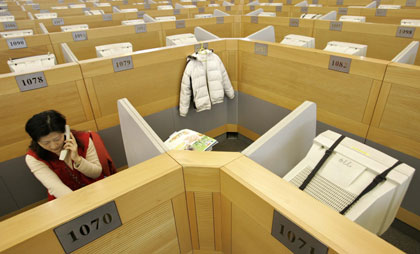China stock market faces bubbles
(chinadaily.com.cn/AFP)Updated: 2007-01-10 14:58
 A broker works at Shanghai Stock Exchange in Lujiazui Financial Area in Shanghai January 9, 2007. [Reuters]  |
After a string of negative forecasts about the currently booming real estate market and open-end investments, Xie now points a finger at the two major stock markets of China which he believes is over-heated.
However, Xie poured cold water on the stock fever, asserting that with high liquidity causing enormous expansions in the Chinese stock market, it may have to experience a painful readjustment in the future, echoing a similar bust in 2001. He also stated that with the mainland's excessive liquidity levels being the source of growth, bubbles are liable to appear at the same time.
According to Xie, the popular notion among stock analysts that the Chinese stock house is "still too small in comparison to GDP, and this growth is only to ensure that it is on the same level as the overall economy" is "completely incorrect". Xie said that in Hong Kong and Shanghai, the publicly listed companies' market capitalization have reached 90 per cent of GDP, a level similar to the global average.
A worrying sign, said Xie, is the swift increase in the price-to-earning ratios for many Chinese shares. In 2006, price-to-earning ratio was at 25 high. As one of the most important barometers for the stock market, Xie said that current publicly listed companies' earnings remain relatively poor, as he deemed an average 15 price-to-earning ratio should be more appropriate and safe. The economist said any further rise in the P/E ratio beyond 25 would induce bubbles.
Xie, renowned for accurately predicting the housing market meltdown of Hong Kong in late 1990s, said that China's stock market boom could end with interference from Beijing, as happened before. In the long run, China's economic performance will resonate with its capital market fluctuations, he asserted.
China's Shanghai and Shenzhen stock markets have been on
a bullish run ever since last September, triggered by a relaxing government
regulation on corporate investment, and confidence-building among the individual
investors who feel upbeat on China's economy. The Shanghai stock indices closed
at more than 2,800 points on Tuesday, rising more than 135 percent as compared
with six month ago.
Spectacular debut highlights concerns over
possible bubble
China Life Insurance's exceptionally strong
debut in Shanghai may bode well for other mainland companies seeking a local
listing but analysts are troubled by what they see as unrealistic gains.
Shares of the nation's largest life insurer more than doubled on Tuesday, topping the most exuberant market expectations following an initial public offering that hauled in US$3.6 billion.
China Life Insurance, which listed in Hong Kong and New York in 2003, closed at 38.93 yuan (US$4.99) on the Shanghai exchange, up 106.2 percent from its offer price of 18.88 yuan.
The rise pushed the benchmark Shanghai Composite Index to a record close Tuesday of 2,807.80, up 100.61 points on all-time high turnover of 86.22 billion yuan.
China's Life Insurance's debut symbolised what has been a spectacular bull run on the Shanghai bourse since the beginning of last year.
The Shanghai index recorded gains of nearly 130 percent in 2006, to make it the world's best performing major bourse of the year, staging a remarkable turnaround from 18 months ago when prices floundered at eight-year lows.
Since the start of trade after the New Year the key Shanghai index has climbed more than three percent from 2,715.72 points.
Investors have poured into to the equities market after being encouraged in part by the government's state-share reform overhaul, which effectively de-linked most Chinese companies from the state and made them public.
But, as with China Life Insurance, analysts worry about the lack of fundamentals behind the unprecedented gains in stock values.
"The reason for this strong rally is because there is demand for shares in China, mostly due to the bull market and the amount of liquidity around," said Chan Baoling, an insurance analyst with Fox-Pitt, Kelton in Hong Kong.
While analysts expect the current fever to continue for a little while, Zhang Qi from Shanghai-based Haitong Securities said he was concerned about the market being driven primarily by the massive influx of fresh funds rather than coroporate fundamentals.
"The market performance is based on the direction and scale of the capital flows rather than the companies' profits and return ratios," Zhang warned. "The boom in the stock market is not rational."
And as with the rest of the stock market, analysts believe China Life Insurance will not be able to sustain its early momentum.
In New York trade Tuesday, investors sounded a clear warning, as China Life's shares -- listed as American Depository Receipts -- plummeted 10.29 percent or US$5.55 to 48.36.
On the Hong Kong exchange China Life's shares closed Tuesday at 25.60 Hong Kong dollars, down 1.25 dollars or 4.66 percent.
Dorris Chen, an analyst at BNP Paribas Peregrine, said the selling clearly indicated that the Shanghai listing had overshot.
"The H-share (Hong Kong share) fall indicates that international investors are more rational and they think its current price is already overvalued," Chen said.
Michael Chang, at the Daiwa Institute of Research in Hong Kong, also warned that the insurer's heady rise in Shanghai was driven by speculative demand from retail investors seeking to buy into China's bull market.
Prices of newly listed companies' shares in China often rise sharply on their debut but the gains are more often than not of a speculative nature.
While expectations for profits in the China's fast growing insurance sector remain strong, Chang said the company's current share valuations were not justified.
However Chang added that would not stop investors from trying to seek the same sort of quick profits in Ping An, China's second largest insurer, which is expected to offer shares in Shanghai sometime in the first quarter.
|
||
|
||
|
|
